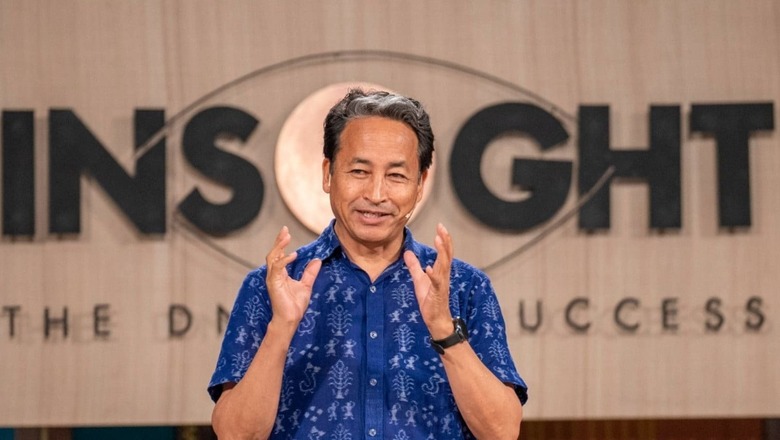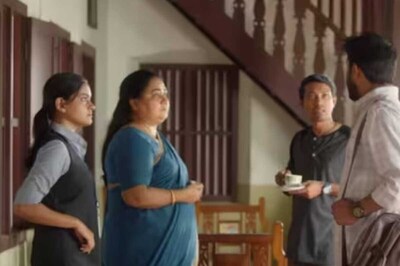
views
To learn, you don’t need schools and teachers. What you need is what you get from nature, said Sonam Wangchuk, Director, Himalayan Institute of Alternatives, Ladakh (HIAL), as he spoke about the meaning of true entrepreneurship in an invigorating session on Day 2 of Isha Insight 2022.
The third day of the 11th edition of Isha Leadership Academy’s flagship programme – ‘ Isha Insight: The DNA of Success’ — saw Wangchuk flying down from Afghanistan for the event at the Isha Yoga Centre in Coimbatore.
“Nature is the best software and it comes pre-loaded with a hardware and we call it curiosity,” said Wangchuk.
He also pointed out that ‘curiosity, empathy and taking initiative’ are the cornerstones of his rather non-conventional education.
"To learn you don’t need schools. You need what you get from nature, which is the best software and it comes pre-loaded with the hardware. We call it curiosity." –@Wangchuk66, engineer and renowned innovator.@innovator @education pic.twitter.com/FByjoVUEnT— Isha Leadership Academy (@IshaLeadership) November 25, 2022
“More often than not, teachers delete this learning software or parents delete the joy of using this software and then spend time on why my child is not interested in learning and reading,” said Wangchuk, emphasizing on laying the strong foundations of learning and education right from childhood.
"Empathy is important for entrepreneurs as businesses that stem out of a genuine urge to solve people's problems really click. You don't need to then advertise because you are solving real problems." – @Wangchuk66 #ishainsight #education #innovator— Isha Leadership Academy (@IshaLeadership) November 25, 2022
Empathy is the second pillar that he swears by, even in his businesses. “Empathy is not just about being a good person, but what you do to help others and not to harm others,” said the social entrepreneur, as he likes to call himself.
"Curiosity alone won’t go far. Because even monkeys and cats are curious. To become a problem solver, you need to back curiosity with empathy, which is the second pillar of my life.” – @Wangchuk66 #education #IshaInsight #innovator pic.twitter.com/hstQ2b5ITo— Isha Leadership Academy (@IshaLeadership) November 25, 2022
Speaking about entrepreneurship, Wangchuk said, “Businesses stem out of a genuine urge to solve problems of the people. Then you don’t have to advertise because you’re solving real problems. If your businesses are based on empathy, these are the businesses that would go on for generations without much artificial fiddling.”
"Curiosity, empathy, initiative – three pillars of my life that have made me who I am." – @Wangchuk66, the man who inspired the famous movie "3 Idiots"#education #entrepreneur #innovator pic.twitter.com/AwsTrDGrkD— Isha Leadership Academy (@IshaLeadership) November 25, 2022
“Empathy alone won’t do much without initiative. Initiative is what finally changes the world – to go out and do what you feel out of empathy and curiosity,” said Wangchuk, adding that these three pillars of life are never taught in our schools. Giving an example from his life, Wangchuk said that whether it was a broken door knob or an unfair system in society, his father would go and stick his neck out.
Highlighting the gaping holes in the present education system, Wangchuk said, “Only 5% of the population has their children in schools which are maybe better than those in America. But 95% of our children study in schools worse than those in sub-saharan African schools.”
Wangchuk, who has been working for the past 30 years to bring reforms in government schools in Ladakh, said, “Higher education in India is no better. Be it in the cold mountain deserts of Ladakh to the hottest deserts in Rajasthan, every student is studying the same curriculum as a ritual. We need profound reforms in higher education that empower them to solve problems in their surroundings.”
He said that establishing alternative universities is important to build a strong generation of problem-solvers.
"As entrepreneurs and businessmen, instead of getting that 45th pair of shoes for yourself, buy someone the first pair of shoes and you will be the lucky winner in modern economics." – @Wangchuk66 shares his unique perspective with #IshaInsight participants.#education #innovator pic.twitter.com/coYuyJ1KGK— Isha Leadership Academy (@IshaLeadership) November 25, 2022
Wangchuk believes that one needs to be a little “off” to become a good entrepreneur and not just make money by solving problems. Citing Gautama Buddha as an example of becoming “entrepreneurs with hearts”, Wangchuk said, “It is a greater achievement to conquer one desire than to fulfill 1,000 desires. Modern economics explains the laws of diminishing returns when you buy your first pair of shoes and it feels wonderful because your feet were bleeding before that. Then you purchase your second, third, fourth, 20th and 44th, but it doesn’t even touch you. So there’s no utility”.
"It is a greater achievement to conquer a single desire than to fulfill a 1000 desires," says @Wangchuk66, quoting Buddha.#ishainsight #education #innovation— Isha Leadership Academy (@IshaLeadership) November 25, 2022
He says that modern economics ends here. “I add my twist to this law and tell entrepreneurs to please earn money and also buy the 45th pair of shoes, but not for yourself. Buy it for someone who doesn’t have the first pair of shoes and you will become the lucky winners in modern economics”.
"When you fail in a bad system, two negatives make one positive, and that makes you a good person. This is why we created the School of Failures in Ladakh, where the admission criterion to begin with is failures,” explains @Wangchuk66.#ishainsight #education #innovation— Isha Leadership Academy (@IshaLeadership) November 25, 2022
Sharing his philosophy on failures, the director at HIAL said, “We have built a school of failures, where the admission criteria, to begin with, is failures. Those who have scored too many marks may be on a waiting list, but failures definitely will get the red carpet. And guess what, after a few years in this school, a student who failed five times in the 10th grade does all the things that he did and becomes the Education Minister for Ladakh Hill Council!”
Day 2 of Isha Insight also saw speakers who have grown business from scratch – Kunal Bahl, Co-Founder, AceVector Group (Snapdeal, Unicommerce and Stellaro); Chandra Shekhar Ghosh, MD, CEO – Bandhan Bank and Gautam Saraogi, Founder, CEO – Go Colors.
Day 1 saw a scintillating session with Open Network for Digital Commerce (ONDC) CEO Thampy Koshy and Sadhguru, Founder, Isha Foundation. The vision behind Isha Insight comes from Sadhguru: “Asking businesses to move on to the next step without the necessary tools and know-how is not fair. As a part of providing them with these tools, we thought we would bring the best minds in the field to offer hands-on knowledge on scaling up. The Isha Insight programme is essentially about helping these businesses scale up.”
Over the past decade, ‘Isha Insight: The DNA of Success’ has become one of the most sought-after business leadership programmes in the world. Previously, programme participants have been mentored by veterans like Ratan Tata, NR Narayana Murthy, Kiran Mazumdar-Shaw, GM Rao, KV Kamath, Ajay Piramal, Harsh Mariwala, Arundhati Bhattacharya, Bhavish Aggarwal, Pawan Goenka, among several others.
Read all the Latest India News here




















Comments
0 comment